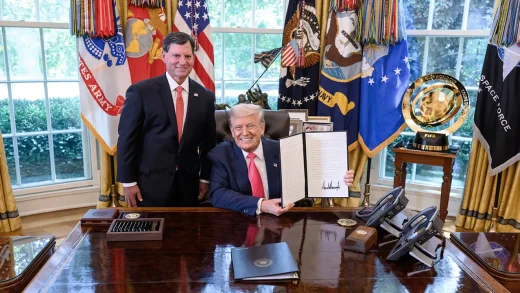U.S. President Donald Trump said Wednesday that Israel and Hamas have agreed to the first phase of his Gaza peace plan that will see all remaining hostages released and Israel withdrawing its troops from the Palestinian territory.
“I am very proud to announce that Israel and Hamas have both signed off on the first Phase of our Peace Plan,” Trump wrote on his Truth Social website.
“This means that ALL of the Hostages will be released very soon, and Israel will withdraw their Troops to an agreed upon line as the first steps toward a Strong, Durable, and Everlasting Peace. All Parties will be treated fairly! This is a GREAT Day for the Arab and Muslim World, Israel, all surrounding Nations, and the United States of America, and we thank the mediators from Qatar, Egypt, and Turkey, who worked with us to make this Historic and Unprecedented Event happen.
Trump concluded his message: “BLESSED ARE THE PEACEMAKERS!” along with his full name and title.
Israeli Prime Minister Benjamin Netanyahu said in a brief statement, “With God’s help, we will bring them all home,” referring to Israeli hostages in Gaza, in response to Trump’s announcement.
The statement came shortly after U.S. Secretary of State Marco Rubio, during an unrelated roundtable event, passed Trump a note on White House stationery that read, “You need to approve a Truth Social post soon so you can announce deal first.”
It also comes just over two years after Hamas’ deadly Oct. 7, 2023, attack on Israel that sparked the military offensive in Gaza.
Secretary of State Marco Rubio writes a note before handing it to President Donald Trump during a roundtable meeting on antifa in the State Dining Room at the White House, Wednesday, Oct. 8, 2025, in Washington. (AP Photo/Evan Vucci).
EV
Trump’s Middle East envoy, Steve Witkoff, and the president’s son-in-law, Jared Kushner, arrived earlier Wednesday at Sharm el-Sheikh for the discussions, as did Qatar’s prime minister, Sheikh Mohammed bin Abdulrahman Al Thani, and Netanyahu’s top adviser, Ron Dermer.
Representatives for the Popular Front for the Liberation of Palestine were also in attendance, and a delegation from Palestinian Islamic Jihad, another fringe militant group that holds an unknown number of Israeli hostages, were scheduled to arrive, according to officials who spoke on condition of anonymity because they weren’t authorized to speak to the media. Their participation underscores the aim of the talks to encompass all Palestinian groups.
A Palestinian official said negotiators made headway Wednesday on the names of prisoners who will be released and on guarantees that Israel won’t resume fighting if the hostages are released.

The official, who spoke on condition of anonymity because he wasn’t allowed to speak publicly about the negotiations, said Hamas promised to release all living hostages but would postpone returning the remains of dead hostages until conditions on the ground in Gaza permits.
The official wouldn’t say which Palestinians Hamas wants Israel to release from jail, adding that mediators informed both sides that a deal must be reached by this Friday. The official said President Trump would declare an end to the war once a final deal is reached.

Get daily National news
Get the day’s top news, political, economic, and current affairs headlines, delivered to your inbox once a day.
Two officials from Arab countries said progress was made in Wednesday’s talks and that a deal could be reached in the coming days. Both spoke on condition of anonymity because they were not authorized to speak to the media.
The Trump plan calls for an immediate ceasefire and release of the 48 hostages that militants in Gaza still hold from their attack on Israel on Oct. 7, 2023, that started the war and triggered Israel’s devastating retaliation. Around 20 of the hostages are believed to still be alive.
It envisions Israel withdrawing its troops from Gaza after Hamas disarms, and an international security force moving in. The territory would be placed under international governance, with Trump and former U.K. Prime Minister Tony Blair overseeing it.
Egyptian President Abdel-Fattah el-Sissi said Wednesday in televised comments that the negotiations so far “were very encouraging.”
Netanyahu has already accepted Trump’s plan. His office said Tuesday that Israel was “cautiously optimistic,” framing the talks as technical negotiations over a plan that both sides already had approved.
In a statement Tuesday, Hamas reiterated its longstanding demands for a lasting ceasefire and a full Israeli withdrawal from Gaza, but said nothing about disarmament, a step it has long resisted. Hamas has also spoken against the idea of international rule, though it has agreed it will have no role in governing post-war Gaza.

Speaking in Sharm el-Sheikh, Khalil al-Hayya, Hamas’ top negotiator, told Egypt’s Qahera TV that the group wanted solid guarantees from Trump and mediators that the war “will not return.” It appeared to be his first public appearance since an Israeli strike targeting him and other top Hamas leaders in Qatar last month killed six people, including his son and office manager.
In January, the two sides had a ceasefire that brought the release of some Israeli hostages in exchange for Palestinians imprisoned by Israel. Under the agreement — which Trump and Witkoff played a major role in brokering — the two sides were then supposed to enter negotiations over a long-term truce, an Israeli withdrawal and a full hostage release.
But Israel broke the ceasefire in March, resuming its campaign of bombardment and offensives, saying it aimed to pressure Hamas for the remaining hostage releases.
Past rounds of negotiations have frequently fallen apart over the same obstacle, with Hamas demanding assurances of the war’s end and Netanyahu vowing to keep fighting until the group is destroyed. The Trump plan attempts to resolve all the issues at once, by laying out Hamas disarmament and a post-war scenario for governing the territory with provisions for a major reconstruction campaign.
In the Hamas-led attack two years ago, militants stormed into southern Israel and killed around 1,200 people, mostly civilians, and abducted 251. Most hostages have since been released in ceasefires or other deals.
A growing number of experts, including those commissioned by a U.N. body, have said that Israel’s offensive in Gaza amounts to genocide — an accusation Israel denies. More than 67,000 Palestinians have been killed in Gaza and nearly 170,000 wounded, according to Gaza’s Health Ministry.

The ministry, which doesn’t differentiate between civilians and combatants but says around half of the deaths were women and children, is part of the Hamas-run government. The United Nations and many independent experts consider its figures to be the most reliable estimate of wartime casualties.
The ministry said Wednesday that the bodies of 10 people killed by Israeli strikes had been brought to local hospitals over the past 24 hours.
In the Gaza Strip, where much of the territory lies in ruins, Palestinians are desperate for a breakthrough. Thousands fleeing Israel’s latest ground offensive in northern Gaza and Gaza City have set up makeshift tents along the beach in the central part of the territory, sometimes using blankets for shelter.
Sara Rihan, a displaced woman from Jabaliya, said she was praying for an end to the war.
“I hope we return to our places and homes even if there are no homes,” she said. “Our existence in our land is the biggest happiness for us.”
AP reporters Sam Mednick in Tel Aviv, Israel, Bassem Mroue in Beirut, Lebanon, and Seung Min Kim and Lisa Mascaro in Washington, contributed to this report.





